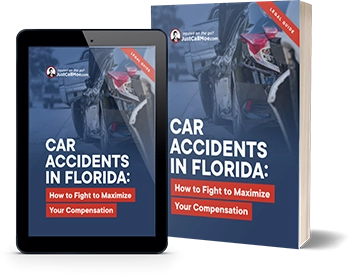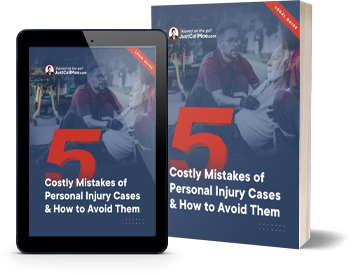When a serious car crash happens in Orlando, determining who is at fault and legally responsible for damages is not always straightforward. In some cases, an individual or company who was not even present at the accident scene may be held accountable. This concept is known as vicarious liability. At JustCallMoe, our experienced Orlando car accident attorneys help injured Floridians understand how vicarious liability may apply in their cases.
So, what is vicarious liability?
Vicarious Liability Explained
Vicarious liability is a legal doctrine that allows one party to be held responsible for the negligent actions of another party, even if the first party did not directly cause the harm themselves. In the context of Florida car accidents, vicarious liability most commonly arises in situations involving:
- Employers and their employees
- Vehicle owners who lend their car to someone else
- Parents and their children
The fundamental principle behind vicarious liability is that the party with authority or control over the negligent individual should bear responsibility for that person’s conduct. Let’s look at some specific examples of how this may play out.
Employer Liability for Employee Accidents
One of the most frequent applications of vicarious liability relates to companies and their workers.
There is a law related to respondeat superior, where employers can be held liable for the negligent acts of their employees that occur within the scope and course of their job duties.
Imagine a delivery truck driver who works for an Orlando-based logistics company. The driver is out on their regular delivery route but is racing to finish so they can get home early. In their haste, they run a red light and T-bone another vehicle in the intersection, causing severe injuries. In this scenario, the logistics company will likely face vicarious liability for the accident, even though they did not directly cause the crash. The key factors are:
- The driver is an employee of the company (not an independent contractor).
- The accident happened while the driver was performing their regular work duties.
Had the driver caused the crash while running personal errands outside of work, vicarious liability would probably not apply. However, because the accident occurred squarely within the scope of their employment, the company is on the hook.
Vicarious liability in Florida in employer-employee accident cases serves several important policy goals, including the following:
- It provides an additional source of compensation for injured accident victims since companies typically have much higher insurance coverage than individual drivers.
- It incentivizes employers to prioritize safe driving practices and training for their workers.
- It allocates risk to the party profiting from the employee’s activities.
Owner Liability for Permissive Drivers
Another common vicarious liability scenario arises when vehicle owners let friends, family members, or others drive their car. Under Florida’s dangerous instrumentality doctrine, a vehicle owner who voluntarily entrusts their car to another person can be held responsible for that permissive driver’s negligence behind the wheel.
For example, let’s say a husband allows his wife to take his pickup truck to run errands around Winter Haven. On her way to the supermarket, the wife causes an accident because she is distracted by her cell phone. In this case, both the husband and wife may face legal liability:
- The wife for directly causing the accident through negligent driving.
- The husband vicariously as the owner who consented to his wife driving the vehicle.
Importantly, the husband’s vicarious liability would attach even if he was not in the vehicle at the time of the crash. It flows purely from his ownership of the truck and his decision to entrust it to his wife.
Parental Responsibility for Children’s Driving
A third vicarious liability scenario that can arise in Orlando car accident cases involves the negligent driving of minor children. In Florida, parents who allow their child to drive the family vehicle can be held liable if that child causes an accident.
Consider a 16-year-old who has just gotten their driver’s license. Eager to impress their friends, the teen driver is speeding down International Drive, loses control of the car, and crashes into an oncoming vehicle. The teen’s parents can potentially face vicarious liability for allowing their child to drive. The public policy rationales here are similar to the employer-employee context—the parents bear ultimate responsibility for negligently entrusting a “dangerous instrumentality” to their child.
Establishing Vicarious Liability in Your Case
If you have been seriously injured in an Orlando-area car accident, it is crucial to explore all potential avenues for recovering the compensation you need and deserve. Vicarious liability is one tool we can use to hold additional parties accountable and tap into larger insurance policies.
At JustCallMoe, our knowledgeable car accident lawyers will dig deep into the facts of your case to identify any vicarious liability arguments. We will look at key issues like:
- Was the at fault driver on the job at the time of the crash?
- Who owns the vehicle that caused the accident?
- Was the at fault driver a minor with access to a family car?
Armed with this information, we can build the strongest possible case for maximizing your financial recovery. While the negligent driver remains primarily liable, vicarious responsibility can provide an important secondary source of compensation.
Injured on the Go in Orlando? JustCallMoe!
We know that being injured in a serious car accident is overwhelming. The legal issues, including vicarious liability, can feel complicated and confusing. At JustCallMoe, we are here to be your guide.
Our dedicated attorneys have decades of experience successfully handling car accident claims across Florida, including in Winter Haven and the Greater Orlando area. We are well-versed in vicarious liability principles and know how to apply them strategically in your case.
You can count on our team to fight tirelessly for every dollar you deserve.
If you have been harmed by another driver’s negligence, do not hesitate to contact JustCallMoe for a free consultation. Our team will make every effort to ensure that your rights are protected and you receive fair compensation. Remember, we are only a call away! Contact us today.

 (866) 225-5663
(866) 225-5663



